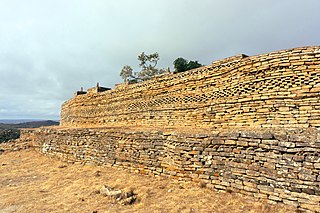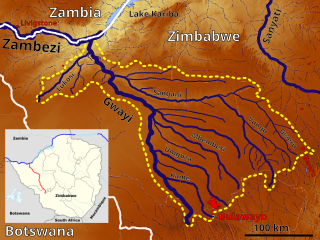
This article is about the demographic features of the population of Zimbabwe, including population density, ethnicity, education level, health of the populace, economic status, religious affiliations and other aspects of the population.

Masvingo is a province in southeastern Zimbabwe. It has a population of 1.485 million as of the 2012 census, ranking fifth out of Zimbabwe's ten provinces. Established as Victoria Province by the British South Africa Company, it was one of the five original provinces of Southern Rhodesia. In 1982, two years after Zimbabwean independence, it was renamed Masvingo Province. The province is divided into seven districts, including Masvingo District, which contains the provincial capital Masvingo City.

Matabeleland South is a province in southwestern Zimbabwe. With a population of 683,893 as of the 2012 census, it is the country's least populous province. After Matabeleland North, it is Zimbabwe's second-least densely populated province. Matabeleland South was established in 1974, when the original Matabeleland Province was divided into two provinces, the other being Matabeleland North. The province is divided into six districts. Gwanda is the capital, and the Beitbridge is the province's largest town. The name "Matabeleland" is derived from Ndebele, the province's largest ethnic group.

Matabeleland is a region located in southwestern Zimbabwe that is divided into three provinces: Matabeleland North, Bulawayo,and Matabeleland South. These provinces are in the west and south-west of Zimbabwe, between the Limpopo and Zambezi rivers and are further separated from Midlands by the Shangani River in central Zimbabwe. The region is named after its inhabitants, the Ndebele people who were called 'Matabele' by British as they failed to pronounce 'Ma Ndebele'. Other ethnic groups who inhabit parts of Matabeleland include the Tonga, Bakalanga, Venda, Nambya, Khoisan, Xhosa, Sotho, Tswana, and Tsonga. The population of Matabeleland is just over 20% of the Zimbabwe's total.
The Ndau are an ethnic group which inhabits the areas in south-eastern Zimbabwe in the districts of Chipinge and Chimanimani in which they are natives. They are also found in parts of Bikita, in the Zambezi valley, in central Mozambique all the way to the coast and in central Malawi. The name "Ndau" is a derivation from the people's traditional salutation "Ndau wee!" in greetings and other social settings. When the Ngoni observed this, they called them the Ndau people, the name itself meaning the land, the place or the country in their language. Some suggestions are that the name is derived from the Nguni words "Amading'indawo" which means "those looking for a place" as this is what the Gaza Nguni called them and the name then evolved to Ndau. This is erroneous as the natives are described in detail to have already been occupying parts of Zimbabwe and Mozambique in 1500s by Joao dos Santos. The five largest Ndau groups are the Magova; the Mashanga; the Vatomboti, the Madanda and the Teve. Ancient Ndau People met with the Khoi/San during the first trade with the Arabs at Shiriyandenga currently known as Mapungumbye. They Traded with Arabs with “Mpalu” “Njeti” and “Vukotlo’’ these are the red,white and blue coloured cloths together with golden beads. Ndau people traded traditional herbs, spiritual powers, Animal skins and bones.

Naletale are ruins located about 25 kilometres east of Shangani in Matabeleland north, Zimbabwe and just north of the Dhlo Dhlo ruins.

The First Matabele War was fought between 1893 and 1894 in modern-day Zimbabwe. It pitted the British South Africa Company against the Ndebele (Matabele) Kingdom. Lobengula, king of the Ndebele, had tried to avoid outright war with the company's pioneers because he and his advisors were mindful of the destructive power of European-produced weapons on traditional Matabele impis attacking in massed ranks. Lobengula reportedly could muster 80,000 spearmen and 20,000 riflemen, armed with Martini-Henry rifles, which were modern arms at that time. However, poor training meant that these were not used effectively.

The Matabeleland Zambezi Water Project (MZWP) is an ambitious project being undertaken in the arid Matabeleland North province of Zimbabwe.The project seeks to end the perennial water shortages bedevilling Zimbabwe's second city of Bulawayo by bringing water from the mighty Zambezi river to the city.

Lupane ( luːpɑːnɛ) District is located in the Matabeleland North Province of Zimbabwe, and it is also the Provincial Capital. The District is situated at an elevation of 976 m with a population of 198,600 inhabitants by 2019. Lupane Town is the main center of the district located 172 km from Bulawayo along the A8 Victoria Falls Road. The Government Provincial Administrative offices are located at the Town Centre. A new university near the Town has been established under the name Lupane State University, which caters for the region and beyond. The word Lupane is thought to be a Kalanga or Lozwi word.

Zimbabwe boasts several tourist attractions, located in almost every region of the country. Before the economic changes, much of the tourism for these locations came to the Zimbabwean side but now Zambia benefits from the tourism. The Victoria Falls National Park is also a tourist attraction in this area and is one of the eight main National Parks in Zimbabwe, largest of which is Hwange National Park.

The Shangani is a river in Zimbabwe that starts near Gweru, Gweru River being one of its main tributaries' and goes through Midlands and Matabeleland North provinces. It empties into the Gwayi River.

Shangani Patrol is a war film based upon the non-fiction book A Time to Die by Robert Cary (1968), and the historical accounts of the Shangani Patrol, with Brian O'Shaughnessy as Major Allan Wilson and Will Hutchins as the lead Scout Frederick Russell Burnham. Also includes the song "Shangani Patrol" by Nick Taylor.
Lower Gwelo is a developed communal settlement in the Midlands province, Zimbabwe and is located about 40km north-west of Gweru, and stretches a further 50 km to the west. Chiefdoms in Lower Gwelo include Sogwala, Sikombingo, Mdubiwa and Bunina.The settlement type is mostly linear along roads, although it is dispersed in some remote areas. There are several business centres which include Mission, Mankunzane, Makepesi, Sikombingo, Dufuya, Mangwande, Sogwala, Maboleni and Insukamini, a former district administration centre which is also one of the few state townships in the country. Maboleni and Insukamini are the two growth points within lower Gwelo.

The Shangani Patrol was a 34-soldier unit of the British South Africa Company that in 1893 was ambushed and annihilated by more than 3,000 Matabele warriors in pre-Southern Rhodesia, during the First Matabele War. Headed by Major Allan Wilson, the patrol was attacked just north of the Shangani River in Matabeleland, Rhodesia. Its dramatic last stand, sometimes called "Wilson's Last Stand", achieved a prominent place in the British public imagination and, subsequently, in Rhodesian history, similarly to events such as the Battle of the Little Bighorn in the United States, the Battle of Shiroyama in Japan, the Battle of the Alamo in Texas, and the Greeks' last stand at Thermopylae.

Public holidays in Rhodesia, a historical region in southern Africa equivalent to today's Zimbabwe and Zambia—formerly Southern and Northern Rhodesia, respectively—were largely based around milestones in the region's short history. Annual holidays marked various aspects of the arrival of white people during the 1880s and 1890s, as well as the respective unilateral declarations of independence (1965) and of republican government (1970). On these days, most businesses and non-essential services closed. A number of Christian holidays were also observed according to custom, in the traditional British manner, and referred to in official documents by name—Christmas Day, for example, or Easter Monday.
Shangani is a small farming settlement in Zimbabwe, near the Shangani River on the road between Gweru and Bulawayo.
Victoria Falls Primary School is an independent, preparatory, day school for boys and girls in the town of Victoria Falls, Matabeleland North, Zimbabwe. The school was opened in September 1991 at its present location.

Gweru River is a river in Midlands Province of Zimbabwe.
Zimbabwe has an active film culture that includes films made in Zimbabwe during its pre- and post-colonial periods. Economic crisis and political crisis have been features of the industry. A publication from the 1980s counted 14 cinemas in Zimbabwe's capital city, Harare. According to a 1998 report only 15 percent of the population had been to a cinema. European and American films have been made on location in Zimbabwe as well as Indian films. American films are popular in Zimbabwe but face restrictions limiting their distribution.












